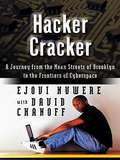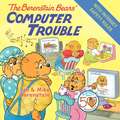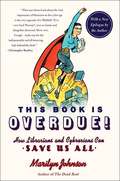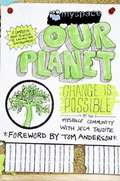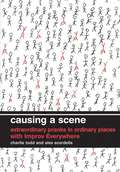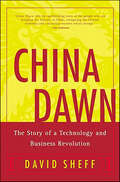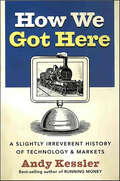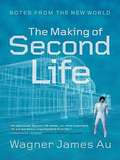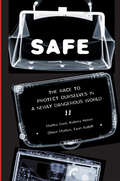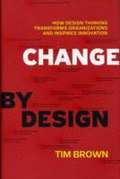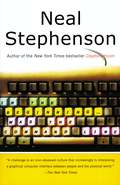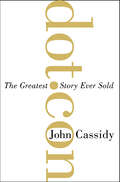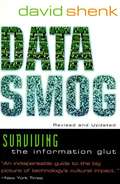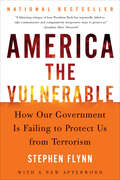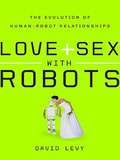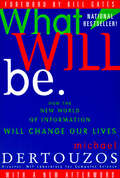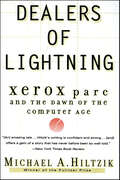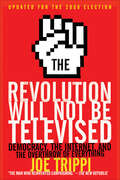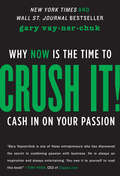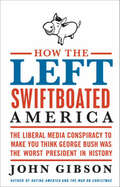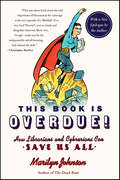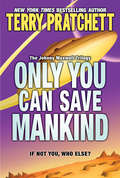- Table View
- List View
Hacker Cracker: A Journey from the Mean Streets of Brooklyn to the Frontiers of Cyberspace
by David Chanoff Ejovi NuwereLike other kids in the Bedford-Stuyvesant neighborhood of Brooklyn, Ejovi Nuwere grew up among thugs and drug dealers. When he was eleven, he helped form a gang; at twelve, he attempted suicide. In his large, extended family, one uncle was a career criminal, one a graduate student with his own computer. By the time Ejovi was fourteen, he was spending as much time on the computer as his uncle was. Within a year he was well on his way to a hacking career that would lead him to one of the most audacious and potentially dangerous computer break-ins of all time, secret until now. Before he finished high school he had created a hidden life in the hacker underground and an increasingly prominent career as a computer security consultant. At the age of twenty-two, he was a top security specialist for one of the world's largest financial houses. Hacker Cracker is at once the most candid revelation to date of the dark secrets of cyberspace and the simple, unaffected story of an inner-city child's triumph over shattering odds to achieve unparalleled success.
The Berenstain Bears' Computer Trouble (I Can Read!)
by Jan Berenstain Mike BerenstainWhen Papa brings home a computer, the whole family is excited. Soon Mama, Brother, Sister, and even Honey start spending all day every day staring at their own computers. It's up to Papa to get the family off the computer and back into the real world!
This Book Is Overdue! How Librarians and Cybrarians Can Save Us All
by Marilyn JohnsonBuried in info? Cross-eyed over technology? From the bottom of a pile of paper, disks, books, e-books, and scattered thumb drives comes a cry of hope: Make way for the librarians--they can help! Those who predicted the death of libraries forgot to consider that, in the automated maze of contemporary life, none of us--expert and hopelessly baffled alike--can get along without human help. And not just any help: we need librarians, the only ones who can save us from being buried by the digital age. This Book Is Overdue!is a romp through the ranks of information professionals--from the blunt and obscenely funny bloggers to the quiet, law-abiding librarians gagged by the FBI. These are the pragmatic idealists who fuse the tools of the digital age with their love for the written word and the enduring values of free speech, open access, and scout-badge-quality assistance to anyone in need.
MySpace/OurPlanet: Change Is Possible
by Tom Anderson Dan Santat Jeca Taudte Myspace Community Staff Community MyspaceYou can change the world. Here's how. Our climate is changing and human actions are the cause. Maybe you don't know why, or what to do about it. We do. In fact, we wrote a book about it (this book, the one in your hands). We'll harness your green intentions and push you beyond turning off the AC every once in a while. It's all in here: how to keep the planet healthy facts and info real-life stories suggestions and challenges eco-tips from MySpace users around the globe. Everybody who submitted a tip got their username in this book, btw. Each of us has the power to make a difference-open this book, arm yourself with knowledge, and start now. (Seriously. What are you waiting for?)
Causing a Scene: Extraordinary Pranks in Ordinary Places with Improv Everywhere
by Charlie Todd Alex ScordelisImprov Everywhere has been responsible for some of the most original and subversive pranks of the Internet age.
China Dawn: The Story of Technology and Business Revolution
by David SheffImagine living through the breakthrough moments of Bill Gates, Steve Jobs, and the other icons of today's new economy. The kind of technological revolution that they led in Silicon Valley is now sweeping through China, but with much more dramatic implications. The dynamic entrepreneurs who are using technology to radically transform business and cultural life in China are fighting not only outdated business models and a tumultuous economy but also an unpredictable government that has a love-hate relationship with the Net, at once pushing its expansion at a feverish pace and censoring it. As Duncan Clark, cofounder of BDA, an Internet consulting company in Beijing, told author David Sheff, "This environment -- the regulations, the competition, the political uncertainties -- makes these the fastest, most courageous, nimblest-thinking people globally. To deal with this level of risk and still sleep is no small accomplishment. But they're hooked on it like some Chinese are becoming hooked on Starbucks cappuccino."In this irresistible, groundbreaking book, Sheff takes us into the trenches of the Chinese technology revolution, introducing the major and minor players who are leading China into the twenty-first century. Players like Bo Feng, the charismatic former sushi chef who is now one of the leading venture capitalists in China. And Edward Tian, a national hero who has been described as China's Steve Jobs and Bill Gates combined, who left his own start-up on the eve of its IPO in order to lead the government's attempt to bring broadband to the entire nation, in the process leapfrogging the United States, Europe, and the rest of Asia with the longest and fastest network in the world. As the U.S. technological revolution wanes, business leaders will be looking to the billion-plus potential customers in China for new growth. In addition, the world's newest member of the World Trade Organization will no longer be a bystander in the global economy; it will be a fierce competitor. And when hundreds of million Chinese have access to unprecedented information and communication, China itself will be profoundly altered. Jay Chang, an analyst who covers China for Credit Suisse First Boston, sums the seismic nature of the changes: "What happens when China successfully transforms from a mainly agrarian/industrial nation into one that has significant input from the information technology industry? What happens when eighty percent of the state-owned enterprises in China are able to link economically to the global Internet on fast pipes? What happens when China's engineering talent pool is able to gain access to high-end computing resources and exchange ideas and information easily with their global peers? What happens when fifty percent of the Chinese population gets wired in ten years -- six hundred million people, the largest number of Internet users in the world?" With its compelling, character-driven story, researched over the course of three years, China Dawn will be the definitive book on the subject.
How We Got Here: A Slightly Irreverent History of Technology & Markets
by Andy KesslerBest-selling author Andy Kessler ties up the loose ends from his provocative book, Running Money, with this history of breakthrough technology and the markets that funded them.Expanding on themes first raised in his tour de force, Running Money, Andy Kessler unpacks the entire history of Silicon Valley and Wall Street, from the Industrial Revolution to computers, communications, money, gold and stock markets. These stories cut (by an unscrupulous editor) from the original manuscript were intended as a primer on the ways in which new technologies develop from unprofitable curiosities to essential investments. Indeed, How We Got Here is the book Kessler wishes someone had handed him on his first day as a freshman engineering student at Cornell or on the day he started on Wall Street. This book connects the dots through history to how we got to where we are today.
The Making of Second Life
by Wagner James AuThe wholly virtual world known as Second Life has attracted more than a million active users, millions of dollars, and created its own-very real-economy. The Making of Second Life is the behind-the-scenes story of the Web 2.0 revolution's most improbable enterprise: the creation of a virtual 3-D world with its own industries, culture, and social systems. Now the toast of the Internet economy, and the subject of countless news articles, profiles, and television shows, Second Life is usually known for the wealth of real-world companies (Reuters, Pontiac, IBM) that have created "virtual offices" within it, and the number of users ("avatars") who have become wealthy through their user-created content. What sets Second Life apart from other online worlds, and what has made it such a success (one million-plus monthly users and growing) is its simple user-centered philosophy. Instead of attempting to control the activities of those who enter it, the creators of Second Life turned them loose: users (also known as Residents) own the rights to the intellectual content they create in-world, and the in-world currency of Linden Dollars is freely exchangeable for U.S. currency. Residents have responded by generating millions of dollars of economic activity through their in-world designs and purchases-currently, the Second Life economy averages more than one million U.S. dollars in transactions every day, while dozens of real-world companies and projects have evolved and developed around content originated in Second Life. Wagner James Au explores the long, implausible road behind that success, and looks at the road ahead, where many believe that user-created worlds like Second Life will become the Net's next generation and the fulcrum for a revolution in the way we shop, work, and interact. Au's story is narrated from both within the corporate offices of Linden Lab, Second Life's creator, and from within Second Life itself, revealing all the fascinating, outrageous, brilliant, and aggravating personalities who make Second Life a very real place-and an illuminating mirror on the real (physical) world. Au writes about the wars they fought (sometimes literally), the transformations they underwent, the empires of land and commerce they developed, and above all, the collaborative creativity that makes their society an imperfect utopia, better in some ways than the one beyond their computer screens.
Pride before the fall
by John Heilemann"John Heilemann's Pride Before the Fall uncovers the secret history of the antitrust trial that shook an economy: United States v. Microsoft. Drawing on years of reporting - including extensive interviews with Gates and other top Microsoft executives, Justice Department trustbuster Joel Klein, superlitigator David Boies, Intel chief Andy Grove, Sun Microsystems CEO Scott McNealy, and scores of lesser-known but pivotal players - Heilemann lays bare the chaotic confluence of forces that shattered Microsoft's aura of invincibility and the climate of fear that held an industry in thrall. " "Based on an acclaimed Wired magazine cover story, Pride Before the Fall is packed with rich personalities, dramatic scenes, and explosive revelations. It tells the stories of the largely unknown men and women who turned their opposition to Gates's company into a crusade, laboring for years to persuade the government to indict Microsoft for its monopolistic practices. Pride Before the Fall explains in compelling detail how the high-tech kingpins whose businesses Gates had tried to destroy or strong-arm (Netscape, Apple, Sun, and even Intel) worked in secret to help the Justice Department bring down Microsoft. It explores the lasting damage the trial has inflicted on the first great empire of the Information Age. And Heilemann offers a vivid and sometimes shocking portrait of Gates himself - describing a man who in 1993 told his friends, "I have as much power as the president," only to be thrown into rage and depression a few years later, when he discovered just how wrong he'd been. "--BOOK JACKET. Title Summary field provided by Blackwell North America, Inc. All Rights Reserved
SAFE: Science and Technology in the Age of Ter
by Martha Baer Katrina HeronIf our society is the most technologically sophisticated on Earth, then why can't we protect ourselves from terrorists and other threats to our safety and security? This is the question that frustrates—and scares—all of us today, and the answers have proved maddeningly elusive. Until now. Through dramatic, enlightening, and often entertaining narratives, SAFE makes visible—and understandable—the high-stakes work being done by some of the most ingenious problem-solvers across the country and around the world, people committed to creating real and dependable security in the twenty-first century.The characters in these pages, from scientists and engineers to academics, entrepreneurs, and emergency workers, take us into a fascinating world of inquiry and discovery. Their stories reveal where our greatest vulnerabilities lie and where our best hope deservedly shines through. They show why the systems we rely on to protect ourselves can also be exploited by others to create catastrophe—and what we can do to outsmart the terrorists. We have ample proof that terrorists will go to great lengths to understand how our technologies can be put to destructive use. Now it's time to ask ourselves a question: Are we willing to let them keep beating us at our own game? For the brilliant and colorful innovators in these pages, the answer is no.Among them are Eric Thompson, an expert digital code breaker instrumental in deciphering hidden Al Qaeda messages; Mike Stein, a New York City firefighter turned technologist who is working to overcome the numerous communications failures of 9/11; Eve Hinman, who conducts structural autopsies at the scene of explosions, including the Oklahoma City bombing, in order to develop more blast-resistant designs; Ken Alibek, the infamous architect of the former Soviet bioweapons program and now an American entrepreneur working in the business of defending his adopted country from bioterrorism; Kris Pister and Michael Sailor, university researchers developing sensors no larger than a speck of dust; Rafi Ron, former head of security for Ben Gurion Airport in Tel Aviv and now a leading strategist on U.S. airport security; Tara O'Toole, who stages doomsday bioterror scenarios in order to craft better biodefense systems; and Jeff Jonas, a high-rolling Las Vegas software entrepreneur whose methods for spotting casino cheats might just have uncovered the 9/11 plot.Readers of SAFE will come away understanding the unique challenges posed by technological progress in a networked, and newly dangerous, world. Witnessing the work of this gathering force of innovators up close, they'll be inspired by the power of the human intellect and spirit—and realize how important the contributions of individual citizens and communities can be.
Change by Design: How Design Thinking Transforms Organizations and Inspires Innovation
by Tim BrownThe myth of innovation is that brilliant ideas leap fully formed from the minds of geniuses. In reality, most innovations are borne from rigor and discipline.
In the Beginning...Was the Command Line
by Neal StephensonThis is "the Word" -- one man's word, certainly -- about the art (and artifice) of the state of our computer-centric existence. And considering that the "one man" is Neal Stephenson, "the hacker Hemingway" (Newsweek) -- acclaimed novelist, pragmatist, seer, nerd-friendly philosopher, and nationally bestselling author of groundbreaking literary works (Snow Crash, Cryptonomicon, etc., etc.) -- the word is well worth hearing. Mostly well-reasoned examination and partial rant, Stephenson's In the Beginning... was the Command Line is a thoughtful, irreverent, hilarious treatise on the cyber-culture past and present; on operating system tyrannies and downloaded popular revolutions; on the Internet, Disney World, Big Bangs, not to mention the meaning of life itself.
Dot.Con: The Greatest Story Ever Sold
by John CassidyThe Internet stock bubble wasn't just about goggle-eyed day traderstrying to get rich on the Nasdaq and goateed twenty-five-year-olds playing wannabe Bill Gates. It was also about an America that believed it had discovered the secret of eternal prosperity: it said something about all of us, and what we thought about ourselves, as the twenty-first century dawned. John Cassidy's Dot.con brings this tumultuous episode to life. Moving from the Cold War Pentagon to Silicon Valley to Wall Street and into the homes of millions of Americans, Cassidy tells the story of the great boom and bust in an authoritative and entertaining narrative. Featuring all the iconic figures of the Internet era -- Marc Andreessen, Jeff Bezos, Steve Case, Alan Greenspan, and many others -- and with a new Afterword on the aftermath of the bust, Dot.con is a panoramic and stirring account of human greed and gullibility.
Data Smog
by David ShenkMedia scholar ( and Internet Enthusiast ) David Shenk examines the troubling effects of information proliferation on our bodies, our brains, our relationships, and our culture, then offers strikingly down-to-earth insights for coping with the deluge. With a skillful mixture of personal essay, firsthand reportage, and sharp analysis, Shenk illustrates the central paradox of our time: as our world gets more complex, our responses to it become increasingly simplistic. He draws convincing links between data smog and stress distraction, indecision, cultural fragmentation, social vulgarity, and more. But there's hope for a saner, more meaningful future, as Shenk offers a wealth of novel prescriptions-both personal and societal-for dispelling data smog.
America the Vulnerable: Struggling to Secure the Homeland
by Stephen FlynnIn this powerful and urgently needed call to action, national security expert Stephen Flynn offers a startling portrait of the radical shortcomings in America's plan for homeland security. He describes a frightening scenario of what the next major terrorist attack might look like -- revealing the tragic loss of life and economic havoc it would leave in its wake, as well as the seismic political consequences it would have in Washington. Flynn also shows us how to prepare for such a disaster, outlining a bold yet practical plan for achieving security in a way that is safe and smart, effective and manageable.In this new world of heightened risk and fear, America the Vulnerable delivers a timely, forceful message that cannot be ignored.
Love and Sex with Robots
by David LevyLove, marriage, and sex with robots? Not in a million years? Maybe a whole lot sooner! A leading expert in artificial intelligence, David Levy argues that the entities we once deemed cold and mechanical will soon become the objects of real companionship and human desire. He shows how automata have evolved and how human interactions with technology have changed over the years. Levy explores many aspects of human relationships--the reasons we fall in love, why we form emotional attachments to animals and virtual pets, and why these same attachments could extend to love for robots. Levy also examines how society's ideas about what constitutes normal sex have changed--and will continue to change--as sexual technology becomes increasingly sophisticated. Shocking, eye-opening, provocative, and utterly convincing, Love and Sex with Robots is compelling reading for anyone with an open mind.
What Will Be: How the New World of Information Will Change Our Lives
by Michael L. DertouzosMichael Dertouzos has been an insightful commentator and an active participant in the creation of the Information Age.Now, in What Will Be, he offers a thought-provoking and entertaining vision of the world of the next decade -- and of the next century. Dertouzos examines the impact that the following new technologies and challenges will have on our lives as the Information Revolution progresses:all the music, film and text ever produced will be available on-demand in our own homesyour "bodynet" will let you make phone calls, check email and pay bills as you walk down the streetadvances in telecommunication will radically alter the role of face-to-face contact in our livesglobal disparities in infrastructure will widen the gap between rich and poorsurgical mini-robots and online care will change the practice of medicine as we know it. Detailed, accessible and visionary, What Will Be  is essential for Information Age revolutionaries and technological neophytes alike.
Dealers of Lightning: Xerox PARC and the Dawn of the Computer Age
by Michael A. HiltzikIn the bestselling tradition of The Soul of a New Machine, Dealers of Lightning is a fascinating journey of intellectual creation. In the 1970s and '80s, Xerox Corporation brought together a brain-trust of engineering geniuses, a group of computer eccentrics dubbed PARC. This brilliant group created several monumental innovations that triggered a technological revolution, including the first personal computer, the laser printer, and the graphical interface (one of the main precursors of the Internet), only to see these breakthroughs rejected by the corporation. Yet, instead of giving up, these determined inventors turned their ideas into empires that radically altered contemporary life and changed the world.Based on extensive interviews with the scientists, engineers, administrators, and executives who lived the story, this riveting chronicle details PARC's humble beginnings through its triumph as a hothouse for ideas, and shows why Xerox was never able to grasp, and ultimately exploit, the cutting-edge innovations PARC delivered. Dealers of Lightning offers an unprecedented look at the ideas, the inventions, and the individuals that propelled Xerox PARC to the frontier of technohistoiy--and the corporate machinations that almost prevented it from achieving greatness.
The Revolution Will Not Be Televised: Democracy, the Internet, and the Overthrow of Everything
by Joe TrippiIn a blend of Wired magazine and The Boys on the Bus, the man who invented Internet politics tells the story of how it was done and reveals how every sector can benefit from tech revolution.Campaign manager Joe Trippi, who signed on to run Howard Dean’s campaign when there was less than $100,000 in the till and fewer than 500 people involved, transformed the most obsure candidate in the field into the Democratic frontrunner and all-but-coronated party nominee in less than a year. The secret of Trippi’s off-the-charts success: a revolutionary use of the Internet, and an impassioned, contagious desire to overthrow politics-as-usual. Before Dean knew it, he had a groundswell of 600,000 Americans behind him, was leading in every poll, and had raised $45 million—more money than any Democrat in history. We now know that unprecedented fundraising, unheard-of numbers of people checking in on the Internet, chatting on blogs, reaching out to their fellow voters and showing up at house parties really can compete with—and in so many ways exceed— the more traditional approaches to winning in politics. But the why’s and how’s leave much fertile ground to plow, and for the first time, Trippi, an icon to all the Dean supporters he energized, is sharing his lessons learned, along with colorful behind-the-scenes stories from the campaign trail. Perhaps lulled by the bust of the dot.com boom, many have dismissed the Internet as old news. But if Dean’s campaign wasn’t enough of a wake-up call, this book is: Trippi reveals just how the sleeping power of technology can be harnessed, and illuminates how every organization and individual in America can benefit from the tidal wave of change on the horizon.
Crush It!: Why NOW Is the Time to Cash In on Your Passion
by Gary VaynerchukIn Crush It!, online marketing trailblazer Gary Vaynerchuk tells business owners what they need to do to boost their sales using the internet—just as he has done to build his family’s wine store from a $4 million business to a $60 million one. Crush It! will show readers how to find their passion, then step by step how to turn it into a flourishing, monetized business.
How the Left Swiftboated America: The Liberal Media Conspiracy to Make You Think George Bush Was the Worst President in History
by John GibsonIn How the Left Swiftboated America, FOX commentator and bestselling author John Gibson offers the first comprehensive defense of the Bush presidency against its numerous detractors. In this provocative political work, Gibson explores who was right and who was wrong in taking us into the Iraq War and a host of other issues, arguing that it was the Left that actually lied while claiming to expose the truth.
This Book Is Overdue!: How Librarians and Cybrarians Can Save Us All
by Marilyn JohnsonIn This Book is Overdue!, acclaimed author Marilyn Johnson celebrates libraries and librarians, and, as she did in her popular first book, The Dead Beat, discovers offbeat and eloquent characters in the quietest corners. In defiance of doomsayers, Johnson finds librarians more vital and necessary than ever, as they fuse the tools of the digital age with love for the written word and the enduring values of truth, service to all, and free speech. This Book Is Overdue! is a romp through the ranks of information professionals who organize our messy world and offer old-fashioned human help through the maze.
Mrs. Yonkers Is Bonkers! (My Weird School #18)
by Dan Gutman Jim PaillotSomething weird is going on!Mrs. Yonkers, the computer teacher, is the nerdiest teacher in the history of the world. She can type with her feet! She buys foam cheeseheads off eBay! She even puts a Webcam on a turtle! Is she trying to take over the planet?
Only You Can Save Mankind (Johnny Maxwell Trilogy #1)
by Terry PratchettThe alien spaceship is in his sights. His finger is on the Fire button. Johnny Maxwell is about to set the new high score on the computer game Only You Can Save Mankind. <P><P>Suddenly:We wish to talk. <P><P>Huh? <P><P> We surrender. <P><P>The aliens aren't supposed to surrender -- they're supposed to die! Now what is Johnny going to do with a fleet of alien prisoners who know their rights under the international rules of war and are demanding safe-conduct? It's hard enough trying to save Mankind from the Galactic Hordes. It's even harder trying to save the Galactic Hordes from Mankind. <P><P>But it's just a game, isn't it? Isn't it? <P><P>Master storyteller Terry Pratchett leaves readers breathless -- with laughter, and with suspense -- in a reality-bending tale of virtual heroism.
